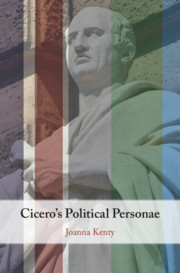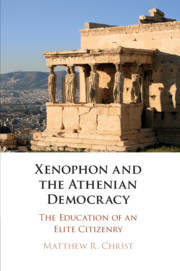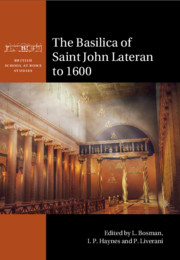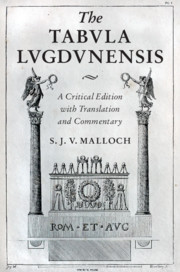Refine search
Actions for selected content:
23990 results in Ancient history
Conclusions
-
- Book:
- Xenophon and the Athenian Democracy
- Published online:
- 28 August 2020
- Print publication:
- 03 September 2020, pp 184-192
-
- Chapter
- Export citation
6 - Professionalism in Archaic and Classical Sculpture in Athens: The Price of Technē
- from Part III - Case Studies of Professions 1: Sculpture
-
-
- Book:
- Skilled Labour and Professionalism in Ancient Greece and Rome
- Published online:
- 18 September 2020
- Print publication:
- 03 September 2020, pp 205-229
-
- Chapter
- Export citation
Copyright page
-
- Book:
- Skilled Labour and Professionalism in Ancient Greece and Rome
- Published online:
- 18 September 2020
- Print publication:
- 03 September 2020, pp iv-iv
-
- Chapter
- Export citation
Contributors
-
- Book:
- Roman Port Societies
- Published online:
- 30 October 2020
- Print publication:
- 03 September 2020, pp xii-xii
-
- Chapter
- Export citation
Abbreviations
-
- Book:
- The Tabula Lugdunensis
- Published online:
- 13 August 2020
- Print publication:
- 03 September 2020, pp xiii-xviii
-
- Chapter
- Export citation
Abbreviations
-
- Book:
- Roman Port Societies
- Published online:
- 30 October 2020
- Print publication:
- 03 September 2020, pp xiii-xiv
-
- Chapter
- Export citation
3 - Stationes and Associations ofMerchants at Puteoli and Delos
-
-
- Book:
- Roman Port Societies
- Published online:
- 30 October 2020
- Print publication:
- 03 September 2020, pp 63-84
-
- Chapter
- Export citation
14 - The Structure of Mercantile Communities in theRoman World
-
-
- Book:
- Roman Port Societies
- Published online:
- 30 October 2020
- Print publication:
- 03 September 2020, pp 326-366
-
- Chapter
- Export citation
Appendices
-
- Book:
- The Tabula Lugdunensis
- Published online:
- 13 August 2020
- Print publication:
- 03 September 2020, pp 163-164
-
- Chapter
- Export citation
Note On The Text nd Translation
- from Text And Translation
-
- Book:
- The Tabula Lugdunensis
- Published online:
- 13 August 2020
- Print publication:
- 03 September 2020, pp 65-66
-
- Chapter
- Export citation
Text And Translation
-
- Book:
- The Tabula Lugdunensis
- Published online:
- 13 August 2020
- Print publication:
- 03 September 2020, pp 63-64
-
- Chapter
- Export citation
2 - Inscriptions and Port Societies
-
-
- Book:
- Roman Port Societies
- Published online:
- 30 October 2020
- Print publication:
- 03 September 2020, pp 36-62
-
- Chapter
- Export citation
Appendix II - Tacitus Annals 11.23–25.1: Text and Translation
- from Appendices
-
- Book:
- The Tabula Lugdunensis
- Published online:
- 13 August 2020
- Print publication:
- 03 September 2020, pp 174-177
-
- Chapter
- Export citation

Cicero's Political Personae
-
- Published online:
- 31 August 2020
- Print publication:
- 10 September 2020

Xenophon and the Athenian Democracy
- The Education of an Elite Citizenry
-
- Published online:
- 28 August 2020
- Print publication:
- 03 September 2020

The Basilica of Saint John Lateran to 1600
-
- Published online:
- 27 August 2020
- Print publication:
- 17 September 2020

The Tabula Lugdunensis
- A Critical Edition with Translation and Commentary
-
- Published online:
- 13 August 2020
- Print publication:
- 03 September 2020
Figures
-
- Book:
- Roman Frugality
- Published online:
- 26 June 2020
- Print publication:
- 09 July 2020, pp vii-vii
-
- Chapter
- Export citation
Chapter 5 - Frugalitas, or: The Invention of a Roman Virtue
-
-
- Book:
- Roman Frugality
- Published online:
- 26 June 2020
- Print publication:
- 09 July 2020, pp 237-346
-
- Chapter
- Export citation
1 - Rome in 700: ‘Constantinople on the Tiber’
-
- Book:
- Rome in the Eighth Century
- Published online:
- 11 June 2020
- Print publication:
- 09 July 2020, pp 1-21
-
- Chapter
- Export citation
